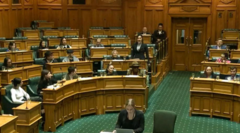In an unprecedented move, New Zealand's parliament has suspended three Māori MPs for their protest haka, igniting discussions about indigenous rights and political expression in the country.
Three Māori MPs Suspended for Haka Protest in Parliament

Three Māori MPs Suspended for Haka Protest in Parliament
Suspensions follow a protest against a controversial treaty bill in New Zealand's parliament
New Zealand's parliament has taken a bold stance, suspending three Māori MPs following their protest haka during a sitting last year. The act, performed by Opposition MP Hana-Rawhiti Maipi-Clarke and co-leaders Rawiri Waititi and Debbie Ngarewa-Packer of the Māori Party, was in response to a contentious bill aimed at redefining the Treaty of Waitangi, New Zealand's founding document with Māori, which attracted significant global attention when a video of the performance went viral last November.
Maipi-Clarke received a seven-day suspension, while her two colleagues faced 21-day bans after a parliamentary committee determined their actions could have "intimidated" fellow lawmakers. Their suspensions mark a departure from the political norm in New Zealand, where the longest previous suspension was only three days.
During the debate surrounding their penalties, Maipi-Clarke delivered an emotional address, asserting, "We will never be silenced, and we will never be lost," while questioning whether their vocal opposition was why they faced such punitive actions. The incident highlighted the fraught relationship between the Māori community and the current conservative government, with Foreign Minister Winston Peters facing backlash for labeling the Māori Party as "extremists."
The Treaty Principles Bill, which catalyzed this protest, was ultimately defeated by a wide margin, but not before instigating significant unrest and protests across New Zealand, with over 40,000 participants rallying against it in the capital. Critics of the bill argued it would exacerbate divisions within the nation, while proponents claimed it sought to legally clarify the principles of the historic treaty signed in 1840 during New Zealand's colonization.
As New Zealand navigates the complexities of indigenous rights and political representation, the suspensions of these Māori MPs serve as a pivotal moment in the ongoing discourse surrounding race, governance, and the rights of indigenous populations in the country.
Maipi-Clarke received a seven-day suspension, while her two colleagues faced 21-day bans after a parliamentary committee determined their actions could have "intimidated" fellow lawmakers. Their suspensions mark a departure from the political norm in New Zealand, where the longest previous suspension was only three days.
During the debate surrounding their penalties, Maipi-Clarke delivered an emotional address, asserting, "We will never be silenced, and we will never be lost," while questioning whether their vocal opposition was why they faced such punitive actions. The incident highlighted the fraught relationship between the Māori community and the current conservative government, with Foreign Minister Winston Peters facing backlash for labeling the Māori Party as "extremists."
The Treaty Principles Bill, which catalyzed this protest, was ultimately defeated by a wide margin, but not before instigating significant unrest and protests across New Zealand, with over 40,000 participants rallying against it in the capital. Critics of the bill argued it would exacerbate divisions within the nation, while proponents claimed it sought to legally clarify the principles of the historic treaty signed in 1840 during New Zealand's colonization.
As New Zealand navigates the complexities of indigenous rights and political representation, the suspensions of these Māori MPs serve as a pivotal moment in the ongoing discourse surrounding race, governance, and the rights of indigenous populations in the country.




















